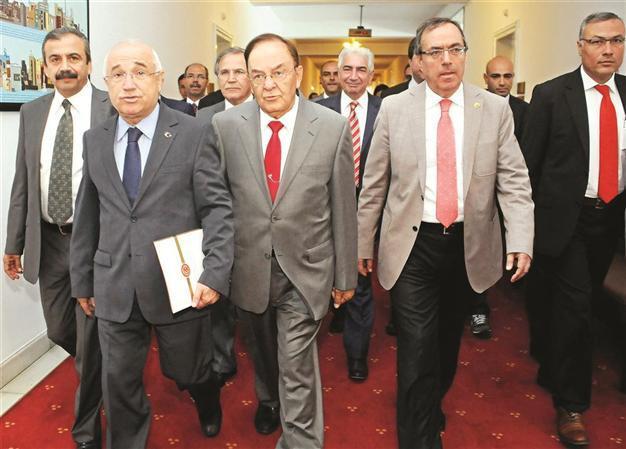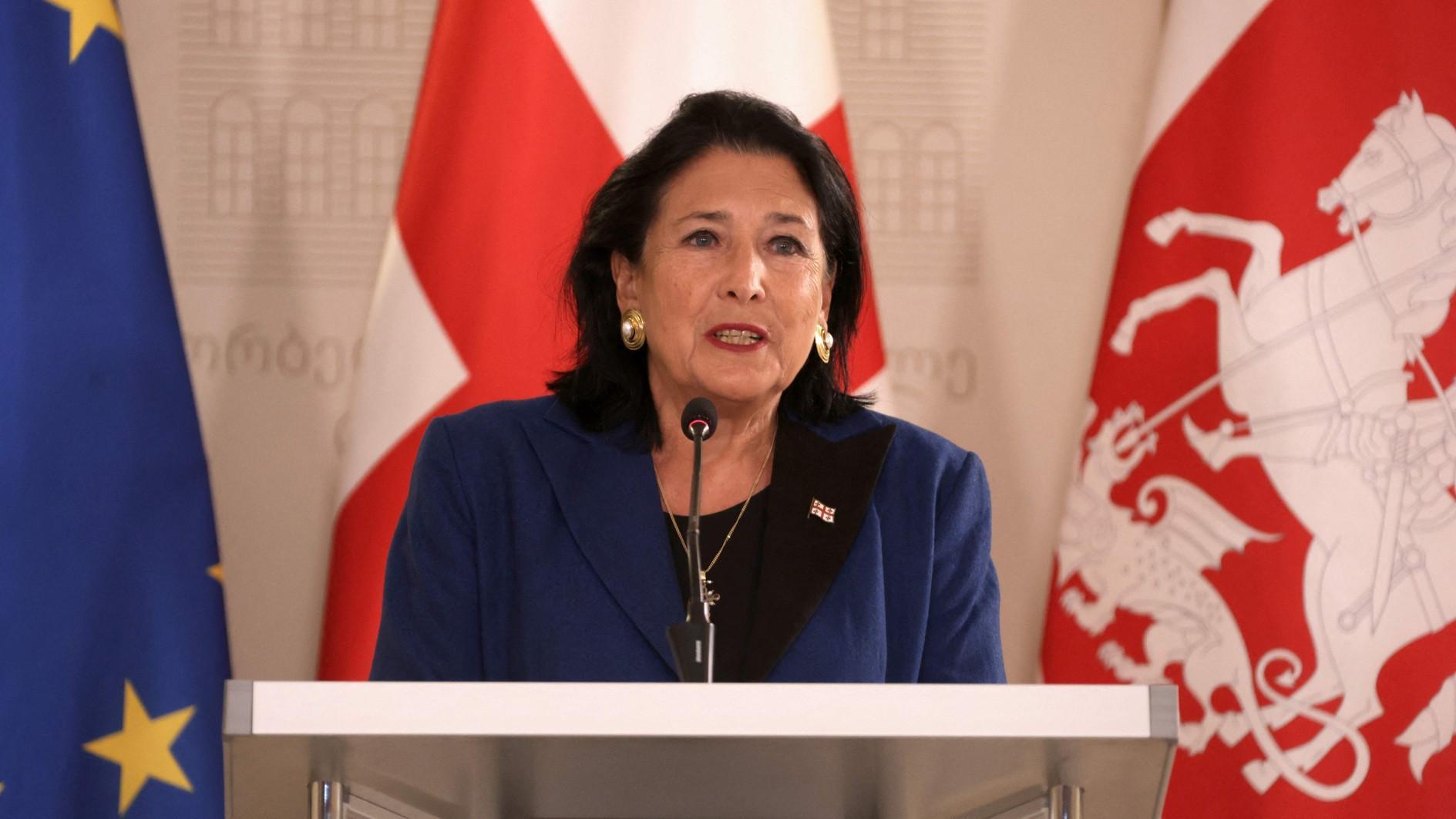Will the referendum for the new Constitution be in September?
ANKARA - Hürriyet Daily News

The head of the Parliament’s Constitution Commission, Cemil Çiçek (2nd L), has been able to overcome all internal crises up to now. DAILY NEWS photo, Selahattin SÖNMEZ
Prime Minister Recep Tayyip Erdoğan has once again put a deadline on the writing of the new constitution process, pointing to the end of March as a deadline for work. This is not an arbitrary date. It is a date that has been thoroughly discussed and decided on at the highest level of the decision-making organs of the Justice and Development Party (AKP).The Constitution Conciliation Commission has dealt with 88 articles in one-and-a-half years and has agreed on nearly 30 of them. However, a number of fundamental issues have still not been tackled in the Commission yet.
No common ground can be found on significant issues such as the preamble to the Constitution, the irrevocable provisions, and the governmental system. For example, while the Republican People’s Party (CHP), the Nationalist Movement Party (MHP) and the Peace and Democracy Party (BDP) defend the parliamentary system, the deadlock cannot be overcome because the AKP has proposed a presidential system. The head of the Commission, Cemil Çiçek, has been able to overcome all crises up to now. However, many are not hopeful for the future, least of all the Commission’s members. For this reason, it seems extremely difficult for the Commission to complete its work by the end of March. Even if it does, because a major proportion of the articles are written in “red” there is not much hope about reaching a joint text.
The AKP has done its planning based on this vision, and has calculated a possible calendar. According to my sources, the party will submit its own Constitution, drafted by itself, to the Parliamentary Speaker’s Office at the beginning of April. The AKP, which has been working on the issue since 2007, has prepared a constitutional draft of between 100 and 120 articles. It has already submitted its views on 88 of these to the Conciliation Commission, and the content will be no different to its own proposal. There is no doubt that the AKP will base its draft on the presidential system.
If this plan works then AKP’s draft will pass through Parliament at the end of June at the latest. When a preparation period of 60 days is taken into consideration for the referendum, the first weeks of autumn are being targeted for the vote. Inside the AKP, mid-September is spoken of as a definite date. The reason for this is the tight schedule: Parliament will convene on Oct. 1; the budget will start being debated at the end of November; the calendar for local elections in March 2014 will begin in December.
Will the AKP’s calculations prove right? It is good to take a look at the Parliament’s arithmetic. A minimum of 330 votes are required for a constitutional change, while any motion accepted with between 330 and 367 votes goes directly to a referendum. The total number of seats occupied by the AKP is 326. Parliament Speaker Cemil Çiçek will conduct the session, so he will not have a vote, dropping the AKP’s number of votes to 325. Therefore, it needs the support of at least five deputies to reach 330. However, even this figure may not be adequate. In the 26-article constitutional amendment package passed on Sept. 12, 2011, the article that made the closing down of political parties more difficult had to be removed from the package because its votes were lower than 330. That was despite the fact that, at that time, the AKP had 337 votes in Parliament. Consequently, the AKP may today need around 340 support votes in order to pass the constitutional motion from scratch.
Constitutional voting in Parliament is conducted according to secret votes. This may be an advantage or a disadvantage for the AKP. With this in mind, the AKP, also calculating the possible internal losses, may opt for searches for individual or institutional support. The AKP does not want to look as if it is directly writing a common Constitution with the BDP, so for this reason it is calculating to seek the individual support of BDP deputies. The BDP, together with the independents, has 34 seats. Because five of its members are currently in jail, it has 29 votes. The AKP also has some vote expectations from the CHP. However, the CHP will not be idling all the time while this is happening. It may abstain the vote as a party in order to prevent possible losses. The MHP, on the other hand, is expected to directly reject the AKP’s constitutional draft.
It is also possible that some deputies may change parties. For example, there is an expectation that Salih Fýrat, who recently resigned from the CHP, will join the AKP in the next term. It is being whispered that a few other names in the CHP are planning to follow suit. AKP Deputy Chair Mustafa Şentop has said that there will not be transfers, “but whoever wants to come will come,” strengthening this assumption. It’s worth remembering that the AKP was able to find external support when passing the 26-article constitutional amendment package in 2011.
So, the AKP will try to bring its own Constitution to Parliament at the beginning of April. But what if it cannot achieve this? It does not consider giving up to be an option. An alternative plan is on the table of the AKP executives. That plan is to change the election law and introduce the single-member constituency system, securing an advantage for their party. Winning the 2015 parliamentary elections by a landslide would allow it to unilaterally change the Constitution and transfer Turkey to a presidential system.
Resignations from CHP prevented at the last minute
The fight between the “new” CHP and the “old” CHP has been postponed for the moment, following party leader Kemal Kýlýçdaroðlu’s call for a truce.
During the recent period a number of incidents were experienced behind closed doors. It is being suggested that an influential name from the ultranationalist wing had tried to resign, but was prevented from doing so at the last moment. It is also being whispered that another party administrator has indicated that he may resign. The latest rumor is that Kýlýçdaroðlu may make a change in a couple of months, changing the party administration by transferring to the old system of having a strong general secretariat.
Why was the Uludere report not publicized?
The Parliamentary Human Rights Sub-commission was formed on Jan. 9, 2012 following an incident where 34 people were killed in an air strike in Uludere. One year has passed and the commission has not submitted its report yet. Despite CHP deputy Levent Gök’s insistent attempts, the reason for this has not been announced either. “The incident is trying to be covered up,” Gök said.
Commission members from the CHP and BDP have claimed the incident might have been orchestrated within the military hierarchy, and said the government was responsible. Gök claims this is the reason behind the report’s continual failure to be published.











